
Andrea Kasinski
Associate Professor of Biological Sciences, Purdue University
Greater than 90% of the human genome is transcribed, yet the functional role for most transcripts is unknown. Many of these unknown transcripts fall into a class of RNAs referred to as non-coding RNAs. The general goal of the Kasinski Lab is to determine the molecular contribution of non-coding RNAs (microRNAs, lncRNA, circRNAs) in normal and disease cells, and to capitalize on this knowledge through developing RNA-based therapeutics. The current projects in the Kasinski lab are subdivided into the following:
Project 1: Ligand-mediated delivery of therapeutically relevant small RNAs
Project 2: Endogenous delivery of RNAs through secreted extracellular vesicles (ie. exosomes)
Project 3: High throughput screening for small molecule inhibitors that alter miRNA biogenesis
Project 4: Identification of miRNAs and protein-coding genes mediating drug resistance
Oct 08, 2024 12:01 pm UTC|
When Victor Ambros and Gary Ruvkun discovered a new molecule they called microRNA in the 1980s, it was a fascinating diversion from what for decades had been called the central dogma of molecular biology. Recognized...

Nov 30, 2023 00:45 am UTC| Science
The Earth formed 4.5 billion years ago, and life less than a billion years after that. Although life as we know it is dependent on four major macromolecules DNA, RNA, proteins and lipids only one is thought to have been...
- Market Data




































